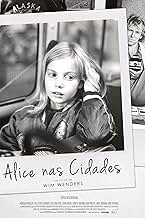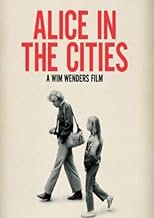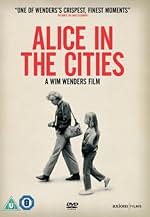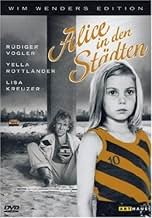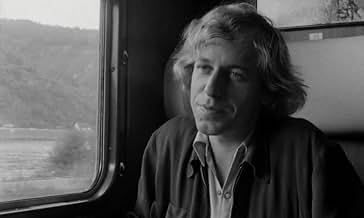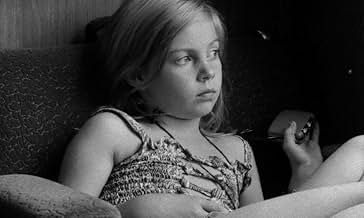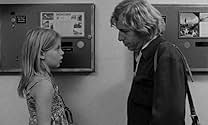Proprio quando sta per lasciare il suolo americano per tornare in patria, un giornalista tedesco incontra all'aeroporto una piccola connazionale di nove anni abbandonata dalla madre.Proprio quando sta per lasciare il suolo americano per tornare in patria, un giornalista tedesco incontra all'aeroporto una piccola connazionale di nove anni abbandonata dalla madre.Proprio quando sta per lasciare il suolo americano per tornare in patria, un giornalista tedesco incontra all'aeroporto una piccola connazionale di nove anni abbandonata dalla madre.
- Regia
- Sceneggiatura
- Star
- Premi
- 1 vittoria e 1 candidatura in totale
- Lisa van Damm
- (as Elisabeth Kreuzer)
- Young Girl on Ferry
- (non citato nei titoli originali)
- Chuck Berry
- (filmato d'archivio)
- (non citato nei titoli originali)
- Man Looking at Monitor in New York Airport
- (non citato nei titoli originali)
- …
- Man at Chuck Berry concert
- (non citato nei titoli originali)
- Organist at Shea Stadium
- (non citato nei titoli originali)
- Woman Behind Philip and Alice on Plane
- (non citato nei titoli originali)
- Man on Empire State Building Roof
- (non citato nei titoli originali)
Recensioni in evidenza
"Alice in the Cities" is the first of three consecutive films by Wim Wenders about the open road, each starring Rüdiger Vogler as a similar, if not identical character. The second, "The Wrong Movement" (Falsche Bewegung) (1975), is an incredibly difficult slog of total human alienation. The third, and much better than the second film, "Kings of the Road" (Im Lauf der Zeit) (1976) is similar to this one, as Mr. Winter continues his journeys through the German countryside.
This is a film about childhood relationships - not those we have with our peers, but those of a greater age. This makes perfect sense to me, as I would without fail seek out the company of an adult over the fleeting fancies of ones closer to me. To me, anything past fully grown would blur together, all except for the very old. Philip isn't comfortable with children, just as I have become over time. It is a hallmark of those who feel that they have never outgrown their own childhood, who feel so lost inside the adult world that the past feels foreign to a present that will never fit. Their belief that living in the future is futile keeps them grounded in today, their only salvation from a life spent dreaming.
Reality is harsh in "Alice in the Cities". The release comes where life lives. The precious and precocious sensation of human interaction runs like a vein through the center of everything. This is a story suitable for anyone, not because it holds back, but because it is all in. In love with the very same world it fears, holding the hands of the same dream on whose feet it steps on. Like we all do in life. This film feels exactly like those first two or three years of your earliest memories. If you let it, you'll be taken further back than you'd have ever imagined.
Between the years 1971 and 1977, Wim Wenders could do no wrong. Yet, even with his best films already on the screen, mainstream success eluded him until 1984, when his over- romanticized Paris, Texas (a fanboy-esquire ode to John Ford and the American landscape) established him as one of Cannes' most beloved filmmakers. Perhaps as a result of commercial success coming from his sappiest work to date, Wenders' chased a tangent that spiraled into career insignificance after 1993's Faraway, So Close! By the mid-late 90's, Wenders' films (documentaries excluded) became achingly pretentious and ripe for parody.
Back in his prime, 1974's Alice in the Cities / Alice in den Städten foreshadowed the near perfection to come in 1976's Kings of the Road / Im Lauf der Zeit. Overshadowed by KOTR, AITC has been overlooked, yet despite its smaller scale, budget and running time, it addresses many of the same themes common to Wenders' best films. The most prevalent of these recurring themes is: der angst (translated: Fear). All of Wenders characters are driven by a fate defined by either Kierkegaard and/or Heidegger's notion of what fear is. Wenders' Angst is the German equivalent of what Existentialism was to the French New Wave, powerful philosophical themes that would ultimately shape the direction of their respective cinematic movements.
If asked to recommend a series of films every fan of cinema should see, I wouldn't hesitate to suggest the films Wenders made between 71-77 (in addition to 1982's The State of Things / Der Stand der Dinge). In my mind these films are meditative, visually hypnotic and poignant essays that speak volumes on the human condition and of film-making itself. These films have inspired me tremendously and if you're a fan of Jim Jarmusch, discovering these films will feel like uncovering a hidden cache of his films. Jarmusch owes a great debt to Wenders both as an inspiration but also as a donor, since it was the short ends from State of Things that enabled Jarmusch to make his exceptional second feature Stranger Than Paradise. If you haven't already seen these films, make the effort...you will be happy you did: The Goalie's Anxiety at the Penalty Kick /Alice in the Cities / Wrong Move / Kings of the Road / The American Friend.
A silenced bewilderment has already become routine in the completely paralyzed life of a man, who only pities himself, and who apparently has lost all access to his fellow men. Therefore the girlfriend in New York, to whom he wants to unburden all his world-weariness can do nothing for him but show him the door, saying: "Nobody told me how to live either."
So he forgot how to live, our very typical hero of modern times. But just as in a children's story rescue suddenly appears in the shape of a wondrous fairy, Philip Winters also has a surprising encounter, which will help him to determine his position in this world anew. The unexpected enlightening figure is a child, nine-year-old Alice. Her mother, whose acquaintance Philip had somehow forcibly made at the airport counter, has let her down, leaving behind a succinct message, in which she asks Winters to take provisionally charge of the girl until she will follow them to Amsterdam in a later airplane.
The mother does not appear though, and thus Philip Winters does not have any other alternative but to go on looking after the child, a responsibility he most willingly would like to avoid. But Alice remains persistent, she scents the possibility of an exciting adventure. She mentions a grandmother, who possibly lives in Wuppertal, West Germany. Unwillingly Winters bows to his fate, but after a few abortive attempts he simply deposits her at a police station and goes to a Chuck Berry concert on his own.
That could be the end of the story. But as I already mentioned, Alice is a fairy. And so she does not only come back, but also actually succeeds in getting a mechanism going in Philip Winters which seemed to be already dead and buried: the reference to the other one, the preparedness to get involved with his fellow creatures. At the end of the film he seems to be recovered, the train in which he and Alice are sitting, is obviously moving along on newly built tracks, the decisive switching of the points has been made.
At least for the time being. For it is exactly in this hopeful and promising moment that we have to leave this wonderful movie. We are just allowed to throw another brief glance at the protagonist, who is sitting in the compartment joyfully united with Alice, a moment before the camera steps back and rises into the air, moving irresistibly away from the scene, until it depicts a vast panoramic view. But our eyes are still fixed on the train that hastens steadily through the immense landscape heading towards a destiny unknown.
This is the first film of what is regarded as Wim Wenders loosely connected road trilogy, following on from this picture would be Falsche Bewegung in 1975 and then culminating with the quite brilliant Im Lauf der Zeit in 1976. Quite what Wenders intentions were with this picture is is not immediately clear, for certain his framing {obsession} with American culture comes to the fore from the off, both in the changing landscapes and the use of American pop and rock music. But as things progress it's the simple message of purpose that a chance encounter can have, our odd couple here are at first deeply suspicious of each other, not caring for each others company in the slightest, but as time moves on they begin to understand each other and tune into each of their respective mental waves. Life quite simply found a way thru two differing humans thrust together unwillingly, it's not deep or remotely profound, it's simple and warm in its execution, and the final (tremendous) pull away aerial shot that Wenders gives us crowns this accomplished and very enjoyable piece. 7.5/10
Lo sapevi?
- QuizThe novel "Tender is the Night" by F. Scott Fitzgerald is seen on the coffee table of Phil Winter's girlfriend. A character in the novel, Rosemary Hoyt, was inspired by Fitzgerald's affair with actress Lois Moran, who appears in this film as an airport hostess. It was Moran's last movie.
- BlooperCrew are reflected in the side of the car (at around 46 mins - sound man, microphone and other crew. This is why so many cars in movies appear dirty or have a matte paint job.).
- Citazioni
Lisa - Alice's Mother: What are you writing?
Philip 'Phil' Winter: The inhuman thing about American TV is not so much that they hack everything up with commercials, though that's bad enough, but in the end all programmes become commercials. Commercials for the status quo. Every image radiates the same disgusting and nauseated message. A kind of boastful contempt. Not one image leaves you in peace, they all want something from you.
- ConnessioniFeatured in Mia toso makryni apousia (1985)
- Colonne sonoreUnder the Boardwalk
Written by Kenny Young and Arthur Resnick
Performed by The Drifters and The Rolling Stones
I più visti
- How long is Alice in the Cities?Powered by Alexa
Dettagli
- Data di uscita
- Paese di origine
- Lingue
- Celebre anche come
- Alice in the Cities
- Luoghi delle riprese
- Aziende produttrici
- Vedi altri crediti dell’azienda su IMDbPro
Botteghino
- Budget
- 500.000 DEM (previsto)
- Lordo in tutto il mondo
- 59.294 USD
- Tempo di esecuzione1 ora 53 minuti
- Colore
- Mix di suoni
Contribuisci a questa pagina



